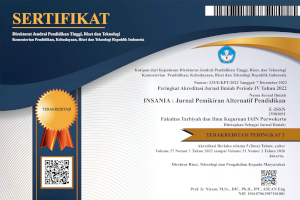SMART EDUCATORS FOR DIGITAL AGE STUDENTS
DOI:
https://doi.org/10.24090/insania.v25i1.3467Keywords:
Smart educators, Digital age students, Education, Industry 4.0Abstract
The purpose of this study was to review the shifting paradigm of educators that should be adjusted to the development and needs of the current generations or in other words educators must be smart to digital age students. This study was conducted by previous studies and associated with the facts that occur at this time or also known as a literature study. The data analysis method used in this study is descriptive analysis method. Results showed that the root reason to shift the old paradigm in education system is not just about technology, but it tends to the needs of ‘new environment’ in learning process for digital age students. Having good skill in technology is a must, but smart educators have greater challange to interprate that skill to create an interesting learning process to absorb the best result from the education system. That is why educators have to shift the old paradigm in education system. Educators have to improve their creativity to create an enjoyable class to attract students’ attention.Downloads
References
Chaves, et.al. 2016. “Education in times net generation: how digital immigrants can teach digital natives?â€. HOLOS, Year 32, Vol. 2.
Crook, C. 2016. “The discourse of a 'smart' technology: implications for educational practiceâ€. International Journal of Smart Technology and Learning, 1(1), 4-20.
Fauziyyah, N. 2019.†The potential of augmented reality to transform education into smart education: a reviewâ€. Jurnal PAJAR (Pendidikan dan Pengajaran), 3(4), 966-973. DOI: http://dx.doi.org/10.33578/pjr.v3i4.7433.
Gaston, J. 2006. “Reaching and teaching the digital nativesâ€. Library HiTech News, Vol. 23 No.3, pp. 12-13.
Herther, N.K. (2009). Digital natives and immigrants, cover story. Online,Vol.33 No.6, p.14.
Hwang, G. J. 2014. “Definition, framework and research issues of smart learning environments- a context-aware ubiquitous learning perspectiveâ€. Smart Learning Environments, 1(1), 4.
Jones, C., et.al. 2010. “Net generation or digital natives: is there a distinct new generation entering university?â€. Computers and Education, 54, 722-732.
Kennedy, g., Judd, t., Churchward, a., Gray, k., Krause. 2008. “First year students’ experiences with technology: are they digital natives?â€. Australasian Journal of Educational Technology, Vol. 24, p.108-122.
Kiryakova, Gabriela, et.al. 2018. “The Potential of augmented reality to transform education into smart educationâ€. TEM Journal, Vol. 7, Issue 3, Pages 556-565.
Marchetta, James, et.al. 2018. “Preferences and learning behaviors of digital nativesâ€. Northeast Business & Economics Association Proceedings 2018.
Prenksy, M. 2001. “Digital natives, digital immigrantsâ€. On the Horizon,Vol.9 No.5, pp.1-6.
Teo, T. 2013. “An initial development and validation of a digital natives assessment scale (DNAS)â€. Computers & Education Journal, vol. 67, pp. 51-57, 2013.
Wan Jusoh and Ahmad. 2016. “iMindMap as an innovative tool in teaching and learning accounting: an exploratory studyâ€. Interactive Technology and Smart Education, Vol. 13 No. 1, pp. 71-82.
Zhu, Z. T., Yu, M. H., and Riezebos, P. 2016. “A research framework of smart educationâ€. Smart Learning Environments, 3(1).
Downloads
Published
How to Cite
Issue
Section
License
Authors who publish with this journal agree to the following terms:
Authors retain copyright and grant the journal right of first publication with the work simultaneously licensed under a Creative CommonsAttribution-ShareAlike License that allows others to share the work with an acknowledgment of the work's authorship and initial publication in this journal.
Authors are able to enter into separate, additional contractual arrangements for the non-exclusive distribution of the journal's published version of the work (e.g., post it to an institutional repository or publish it in a book), with an acknowledgment of its initial publication in this journal.
Authors are permitted and encouraged to post their work online (e.g., in institutional repositories or on their website) prior to and during the submission process, as it can lead to productive exchanges, as well as earlier and greater citation of published work (See The Effect of Open Access).








